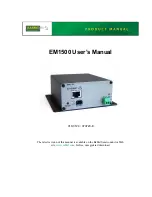
Installation Guidelines for Air-Cooled Generators
3
1.2.1— General Hazards
•
For safety reasons, the manufacturer recommends that this equipment be installed by an independent Sales or
Service Dealer or other competent, qualified electrician or installation technician who is familiar with applicable
codes, standards and regulations. The operator also must comply with all such codes, standards and regula-
tions. Only an Independent Authorized Service Dealer is allowed to perform warranty service on this unit.
•
The engine exhaust fumes contain carbon monoxide, which can be DEADLY. This dangerous gas, if breathed in
sufficient concentrations, can cause unconsciousness or even death. Do NOT alter or add to the exhaust system
or do anything that might render the system unsafe or in noncompliance with applicable codes and standards.
•
Install a battery-operated carbon monoxide alarm indoors, according to manufacturer’s instructions/recommen-
dations.
•
Adequate, unobstructed flow of cooling and ventilating air is critical to correct generator operation. Do not alter
the installation or permit even partial blockage of ventilation provisions, as this can seriously affect safe operation
of the generator.
The generator MUST be installed and operated outdoors only.
•
Keep hands, feet, clothing, etc., away from drive belts, fans, and other moving or hot parts. Never remove any
drive belt or fan guard while the unit is operating.
•
When working on this equipment, remain alert at all times. Never work on the equipment when physically or men-
tally fatigued.
•
Inspect the generator regularly, and contact the nearest Dealer for parts needing repair or replacement.
•
Before performing any maintenance on the generator, disconnect its battery cables to prevent accidental start up.
Disconnect the cable from the battery post indicated by a NEGATIVE, NEG or (–) first, then remove the POSI-
TIVE, POS or (+) cable. When reconnecting the cables, connect the POSITIVE cable first, the NEGATIVE cable
last.
•
Never use the generator or any of its parts as a step. Stepping on the unit can stress and break parts, and may
result in dangerous operating conditions from leaking exhaust gases, fuel leakage, oil leakage, etc.
1.2.2— Electrical Hazards
•
All generators covered by this manual produce dangerous electrical voltages and can cause fatal electrical
shock. Avoid contact with bare wires, terminals, connections, etc., while the unit is running. Ensure all appropri-
ate covers, guards and barriers are in place, secured and/or locked before operating the generator. If work must
be done around an operating unit, stand on an insulated, dry surface to reduce shock hazard.
•
Do not handle any kind of electrical device while standing in water, while barefoot, or while hands or feet are wet.
DANGEROUS ELECTRICAL SHOCK MAY RESULT.
•
The National Electrical Code (NEC) requires the frame and external electrically conductive parts of the generator
to be connected to an approved earth ground. Local electrical codes also may require proper grounding of the
generator electrical system.
•
After installing this home standby electrical system, the generator may crank and start at any time without warn-
ing. When this occurs, load circuits are transferred to the STANDBY (generator) power source. To prevent possi-
ble injury if such a start and transfer occur, always set the generator to the OFF mode, remove the 7.5A fuse
adjacent to the generator control pad, and disconnect the battery before working on equipment.
•
In case of accident caused by electric shock, immediately shut down the source of electrical power. If this is not
possible, attempt to free the victim from the live conductor. AVOID DIRECT CONTACT WITH THE VICTIM. Use
a nonconducting implement, such as a dry rope or board, to free the victim from the live conductor. If the victim is
unconscious, apply first aid and get immediate medical help.
•
Never wear jewelry when working on this equipment. Jewelry can conduct electricity resulting in electric shock,
or may get caught in moving components causing injury.
1.2.3— Fire Hazards
•
For fire safety, the generator must be installed and maintained properly. Installation must always comply with
applicable codes, standards, laws and regulations. Adhere strictly to local, state and national electrical and build-








































